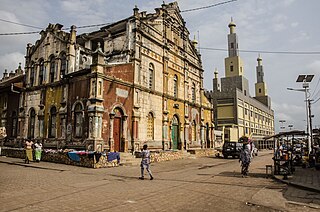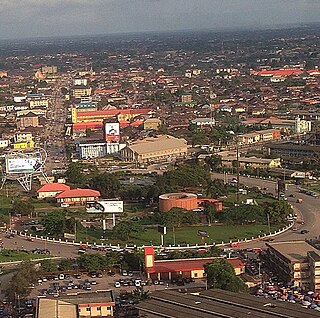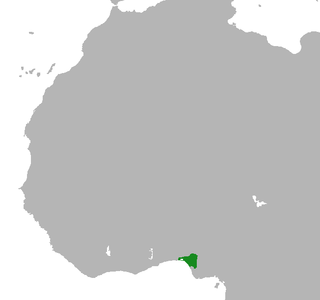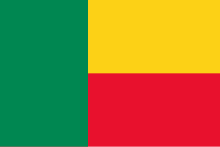
Benin, officially the Republic of Benin, is a country in West Africa. It was formerly known as Dahomey. It is bordered by Togo to the west, Nigeria to the east, Burkina Faso to the north-west, and Niger to the north-east. The majority of its population lives on the southern coastline of the Bight of Benin, part of the Gulf of Guinea in the northernmost tropical portion of the Atlantic Ocean. The capital is Porto-Novo, and the seat of government is in Cotonou, the most populous city and economic capital. Benin covers an area of 112,622 km2 (43,484 sq mi), and its population in 2021 was estimated to be approximately 13 million. It is a tropical country with an economy heavily dependent on agriculture and is an exporter of palm oil and cotton.

The economy of Benin remains underdeveloped and dependent on subsistence agriculture and cotton. Cotton accounts for 40% of Benin's GDP and roughly 80% of official export receipts. There is also production of textiles, palm products, and cocoa beans. Maize (corn), beans, rice, peanuts, cashews, pineapples, cassava, yams, and other various tubers are grown for local subsistence. Benin began producing a modest quantity of offshore oil in October 1982. Production ceased in recent years but exploration of new sites is ongoing.

Cotonou is the largest city in Benin. Its official population count was 679,012 inhabitants in 2012; however, over two million people live in the larger urban area.

Porto-Novo is the capital and second-largest city of Benin. The commune covers an area of 110 square kilometres (42 sq mi) and as of 2002 had a population of 223,552 people.

After seizing power in the 1972 coup d'état, Major Mathieu Kérékou declared the People's Republic of Benin a Marxist-Leninist state and sought financial support from communist governments in Eastern Europe and Asia. To distance the modern state from its colonial past, the country became the People's Republic of Benin in 1975. However, Benin dropped the socialist ideology in 1989 following pressure from creditors and domestic unrest related to economic hardship.

Benin City serves as the capital and largest metropolitan centre of Edo State, situated in southern Nigeria. Notably, it ranks as the fourth-most populous city in Nigeria, according to the 2006 national census, preceded only by Lagos, Kano, and Ibadan.

Benin is divided into 12 departments, and subdivided into 77 communes. In 1999, the previous six departments were each split into two halves, forming the current 12. Each of the six new departments was assigned a capital in 2008.

The Benin national football team, nicknamed Les Guépards , represents Benin in men's international association football and are controlled by the Benin Football Federation. They were known as Dahomey until 1975, when the Republic of Dahomey became Benin.

The University of Benin (UNIBEN) is a public research university located in Benin City, Edo State, Nigeria. It is among the universities owned by the Federal Government of Nigeria and was founded in 1970. The school currently has two campuses with fifteen faculties including a central library called the John Harris Library. The buildings in UNIBEN are sparsely built, they are not close to each other.

Edo, officially known as Edo State, is a state in the South-South geopolitical zone of the federal republic of Nigeria. As of 2024, the state was ranked as the 22nd most populous state (5,250,000) in Nigeria. The estimated state population is around 4,777,000 in 2022. Edo State is the 22nd largest state by landmass in Nigeria. The state's capital and largest city, Benin City, is the fourth largest city in Nigeria, and the centre of the country's rubber industry. Created in 1991 from the former Bendel State, it is also known as the heart beat of the nation. Edo State borders Kogi State to the north for 133 km and across the Niger River for 81 km to the northeast, Anambra State to the east for about four km across the Niger River, Delta State to the southeast and south for 350 km, and Ondo State to the west.

The unicameral National Assembly is Benin's legislative body.
Michel Dussuyer is a French football coach and former professional player.

The Kingdom of Benin, also known as Great Benin or Benin Kingdom is a kingdom within what is now considered southern Nigeria. It has no historical relation to the modern republic of Benin, which was known as Dahomey from the 17th century until 1975. The Kingdom of Benin's capital was Edo, now known as Benin City in Edo State, Nigeria. The Benin Kingdom was one of the oldest and most developed states in the coastal hinterland of West Africa. It grew out of the previous Edo Kingdom of Igodomigodo around the 11th century AD; it was annexed by the British Empire in 1897.

Parliamentary elections were held in Benin on 28 April 2019.

Benin competed at the 2020 Summer Olympics in Tokyo. Originally scheduled to take place from 24 July to 9 August 2020, the Games were postponed to 23 July to 8 August 2021, because of the COVID-19 pandemic. It was the nation's twelfth appearance at the Summer Olympics, with the exception of the 1976 Summer Olympics in Montreal because of the African boycott.
The Apostolic Nunciature to Benin is the diplomatic mission of the Holy See to Benin. The Apostolic Nuncio to Benin is an ecclesiastical office of the Catholic Church in Benin, with the rank of an ambassador. The nuncio serves both as the ambassador of the Holy See to the Republic of Benin and as the point-of-contact between the Catholic hierarchy in Benin and the pope.
The Cinema of Benin refers to the film industry of the Republic of Benin in West Africa.

The COVID-19 pandemic in Benin was a part of the ongoing worldwide pandemic of coronavirus disease 2019 caused by severe acute respiratory syndrome coronavirus 2. The virus was confirmed to have reached Benin in March 2020.

The Progressive Union for Renewal, formerly called Progressive Union, is a political party in Benin, led by Bruno Amoussou. It tends to be more popular in the south of the country.














